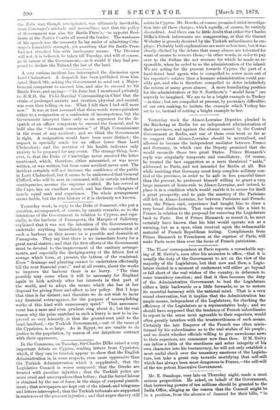The Times' correspondent at Paris reports a remarkable say- ing
of M. Grevy's, soon after his accession to office,—that it is usually the duty of the Government to act on the view of the majority of the Legislature, but that now and then, a Legis- lature elected in a moment of excitement will either go beyond or fall short of the real wishes of the country, in deference to some transitory emotion ; and that it then becomes the duty of the Administrative Government to lead the Legislature either a little backwards or a little forwards, so as to restore its essential harmony with the national mind. That is a very sound observation, but it implies that the Administration has ample means, independent of the Legislature, for checking the efficiency of the Legislature as a representative body; and we should have supposed that the tendency of French subordinates to report in the sense most agreeable to their superiors, would often greatly interfere with the trustworthiness of such means. Certainly the late Emperor of the French was often misin- formed by his subordinates as to the real wishes of his people ; and we doubt whether officials willing to give unwelcome news to their superiors, are commoner now than then. If M. Gr4vy can infuse a little of the sturdiness and sober integrity of hia own character into his bureaucracy, he will not only establish a most useful check over the transitory emotions of the Legisla- ture, but take a great step towards mortifying that self-will which has always been most dangerous to France,—the of the too potent Executive Government.


































 Previous page
Previous page